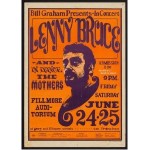Today is the 40th anniversary of George Carlin’s “Seven Words You Can Never Say on Television” routine. So why is this blog post about Lenny Bruce? Because as an Atlantic look at the significance of the routine points out — and as Carlin would freely admit — Lenny Bruce paved the way.
 Bruce has long been one of my heroes. Although I may have been generally aware of him, I think the coincidental release of Albert Goldman’s biography, Ladies and Gentleman, Lenny Bruce!, with the Dustin Hoffman film Lenny cemented my admiration for him. In fact, the artwork at left — a poster advertising Bruce’s performances at the Fillmore in San Francisco about six weeks before his death in August 1966 — is framed and on the wall in my office.
Bruce has long been one of my heroes. Although I may have been generally aware of him, I think the coincidental release of Albert Goldman’s biography, Ladies and Gentleman, Lenny Bruce!, with the Dustin Hoffman film Lenny cemented my admiration for him. In fact, the artwork at left — a poster advertising Bruce’s performances at the Fillmore in San Francisco about six weeks before his death in August 1966 — is framed and on the wall in my office.
For the early 1960s, Bruce was considered a comedian who “worked dirty.” He used obscenities and racial epithets in his act. In fact, he was prosecuted for obscenity several times in the last part of his career and, as Carlin notes in his memoir, they amounted to a slow and methodical assassination. But as with Carlin’s filthy words routine, Bruce was deconstructing language. He believed that it the suppression of language that gave hurtful power to them — and he was intent on skewering racists and American society with the language they used. His increasing obsession with this obscenity prosecutions and drug use led to his death by overdose at age 40.
Either Goldman’s book or the movie are worth the time, although the former is now somewhat difficult to find. Another great introduction is Bruce’s own autobiography, How to Talk Dirty and Influence People, originally serialized in Playboy. Much harder to find is 1970’s The Original Lenny Bruce, transcripts of some of his performances. Most recently there is The Trials of Lenny Bruce, which focuses on his obscenity prosecutions. It, too, is currently out of print.
Although somewhat dated, it is worth listening to Bruce’s performances because there is a lot in them that is timeless. There are a number of releases out there, including some historically notable ones. My personal favorite, Fantasy’s The Real Lenny Bruce, is out of print but there’s plenty of material to choose from.
If you’re in the mood to celebrate our freedoms, read about and listen to Bruce, a man who stood and fought for freedom of speech.
The what-should-be never did exist, but people keep trying to live up to it. There is only what is.
Lenny Bruce, How to Talk Dirty and Influence People








George Carlin has always been a big favorite of mine. I know the 7 Words routine, and a few others, by heart.
I never did see the Hoffman movie, though I always planned on it. I’m not that familiar with Bruce, though I have heard several comedians refer to his trailblazing career.
Thanks for this post.